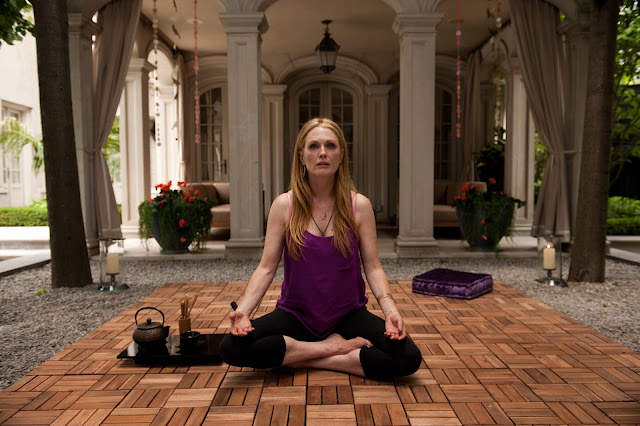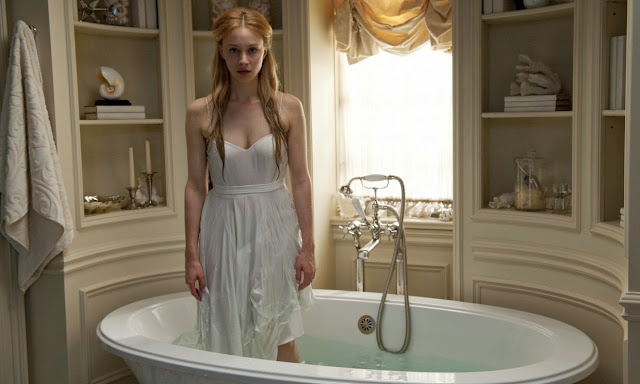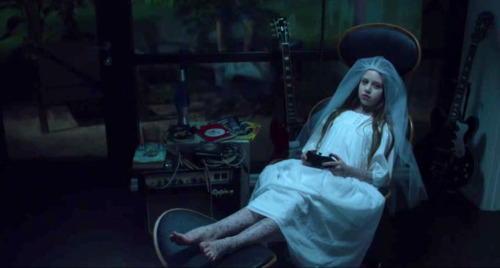 Film as a medium isn't old enough that it has a set response as to how to handle the 'problem' of aging A-list actresses. But two 2014 films both recently released on DVD have shown the 'old' way can be made 'new' again through post-modern tweaks. The sexy young bitches of the 80s-90s have found work playing middle-aged actresses fighting to stay young and relevant, the way hot bitches of the 20s-40s did in the 50s-70s, by playing faded stars who go insane from being cooped up in their cobwebbed minds and mansions while the pictures (and cars) get small. Going 'Norma Desmond' allows for a kind of ageist exorcism which then makes the actress playing the actress seem balanced by contrast. So Billy Wilder makes Gloria Swanson seem cool and Robert Aldrich makes Bette Davis seem fearless. Skulking around their eerie mansions, eerie theremins granting their every mirror-ward hiss Grand-Guignol foreboding, the aging actress playing the aging actress is freed from her own Gerascophobe (by Chanel)-scented strait-jacket (starring Joan Crawford).
Film as a medium isn't old enough that it has a set response as to how to handle the 'problem' of aging A-list actresses. But two 2014 films both recently released on DVD have shown the 'old' way can be made 'new' again through post-modern tweaks. The sexy young bitches of the 80s-90s have found work playing middle-aged actresses fighting to stay young and relevant, the way hot bitches of the 20s-40s did in the 50s-70s, by playing faded stars who go insane from being cooped up in their cobwebbed minds and mansions while the pictures (and cars) get small. Going 'Norma Desmond' allows for a kind of ageist exorcism which then makes the actress playing the actress seem balanced by contrast. So Billy Wilder makes Gloria Swanson seem cool and Robert Aldrich makes Bette Davis seem fearless. Skulking around their eerie mansions, eerie theremins granting their every mirror-ward hiss Grand-Guignol foreboding, the aging actress playing the aging actress is freed from her own Gerascophobe (by Chanel)-scented strait-jacket (starring Joan Crawford).Now that we're all feminists, so the kind of lurid madness that made Baby Jane and Norma Desmond so indelible won't play-- it has to be a sensitive portrait of Alzheimer's, for senior Academy members to lionize. Independent filmmakers circle the wagons around the A-list as they crest through middle and later age, the way they do older men (notice older men and younger women are so often recipients of Best Supporting Actress, so seldom the other way around?). And though those Sony hacks reminded us even major starlets are making less money than their less famous male counterparts, there are great directors who love women and love self-reflexive dissertation, love the madness of their business, and no how much Oscar voters love hearing about how their business is to make our collective dreams. And the actress might even executive produce knowing the strategic value a small name-auteur indie about actresses can have, for Oscar ups your price and focuses your obit. But feminism, so you have to be brave, The Sunset Boulevard model has passed through now to the likes of the world's best post-affect auteurs, like David Cronenberg and Olivier Assayas. For them, in this of all years, the post-modern self-reflexive spirit of Billy Wilder and Robert Aldrich endures. It need only be taken one meta-level further to resonate in our new century's junk TV-addicted consciousness and not offend. So here are Julianne Moore and Juliette Binoche playing Gloria Swansons playing Norma Desmonds instead of just Norma Desmonds still trying to play Salome.

THE CLOUDS OF SILS MARIA
Dir Olivia Assayas (2014)
***
***
Though there's no lady corporate assassins in Clouds of Sils Maria, but it covers similar existential bases, with a trio of strong female leads ranging along the All about Eve axis, playing versions of themselves and each other as they play characters studying to be themselves and each other with the same weird mix of back-stabbing and compassion with which younger executive assistants are shepherded by an older employers into the abyss. It could use some post-affect modernism but instead there's bourgeois European swank, highbrow events, "seas of gray hair" as Maria (Juliette Binoche), an aging European icon who's been talked into playing the older woman having an affair with a hot young heartbreaker-- a role she herself became a star via 20 years earlier. Kristen Stewart steals the show though, as Valentine, Maria's personal assistant, who handles her job with startling cool, knowing just how to rile or soothe or otherwise push Maria's buttons while juggling deals and cars and hotel rooms and interviews and meetings with photographers without ever seeming to break her cool detached stride or get mad at her cell phone. Chloë Grace Moretz is the rising star playing the younger part in the play; Valentine takes Maria to see the latest superhero movie which Moretz stars in, and Maria's mocking laughter (Val's a fan) gradually comes between them.
In other words, it's Bette Davis' The Star meets Petra Von Kant rehearsing a lesbian version of The Blue Angel at the Alpine lodge home of the play's recently deceased writer. It's these rehearsal scenes that carry the film. Stewart and Binoche connect with such quiet force that we understand immediately why Stewart won the César and the dialogue of the play within the film resembles their characters' own relationship and perhaps Stewart's real-life relationship with Alicia Cargile (left) so much it's (intentionally) impossible to tell where one ends and the other begins, except that the line-running they do feels real, while their sudden lurches into directly discussing their own relationship--Valentine complaining as Maria laughs at her impressions of the play's subtext--seems faked. and if Val and Maria themselves have any sexual history or present we never know. As the Binoche-Stewart personae (see what I did there?) merges into itself along with the two characters they're rehearsing via the actress and personal assistant they're playing... there's a sudden mystical shift that... well.. it doesn't work because the whole first 4/5 of the film has been this show business European fly-on-the-wall vérité so to suddenly move into a Freudian ego dissolution parable seems false, as if Assayas didn't trust the relationship to be good enough on its own - he had to keep adding layers until the whole thing deflates like an overdone soufflé. In other words, once again Assayas takes something that's working great, going somewhere new, and derails it with one too many affectations, the same way Irma Vep came to a standstill of pin-scratched Maggie outline celluloid, or that disturbing and strange demonlover denouement, or that so-what escalator in Boarding Gate.
I was really vibing to Stewart and Binoche's chemistry so felt genuinely saddened by the sudden flight into a kind of Peter Weir-ish fourth act mystical disappearance. The big comparison critics have been making of course is L'Aventura, but in that they at least talked about the disappearance, it obsessed them for awhile, until they forgot about it, and we didn't much miss her anyway, since it was Monica Vitti we were collectively falling in love with. Here it's reversed, like Vitti just left without a note toward the end and we spent the rest of the damn movie with the smarmy and insecure Sandro (Gabriele Farzetti). Some critics hypothesize Val kind of morphs into Chloë Grace Moretz, playing the tabloid-branded scarlet letter marriage-wrecker of years ago (see: Kristen Stewart in the Snow with Poison), but in the end, fancy critics can discuss the use of art cinema 'modernity' vs. vérité realism all they want --it just plum doesn't work... for me at least. In interviews Assayas says he wanted to give the audience something to think about, but frankly, he didn't. We'd rather follow Kristen into the clouds than be dragged along with Juliette Binoche into the dungeons of bourgeois theater. After all, Binoche ain't winning no César. Neither is Assayas, for the French are wary of auteurs who sabotage their own work, just so everyone knows it's their's and not some gamin upstart's.

4. MAPS TO THE STARS
(2014) Dir. David Cronenberg
***1/2
One can't imagine either actual Hollywood or the Sils Maria bourgeois European intellectual community, i.e. Assayas, making a film like Maps to the Stars. A lurid, slow-burn haunted Hollywood saga of pyromaniac schizophrenics, ghosts, and egomaniacal stars and life coaches, it could only come from a Canadian indie auteur who doesn't need pretentious vanishings to craft a fiune Brechtian dissertation on aging actresses being intimidated by the younger generation. The similarities between the two films are striking: a behind and in front of the camera mirroring; passive aggressive sabotage by the older insecure actress against her personal assistant, and the merging of personae; the Twilight connection: Stewart in Sils, Pattinson (in a Cronenberg limo again) for Maps. Considering Stewart co-starred with Maps star Julianne Moore in Still Alice the same year (top), it's like an eerie reflection across continents, genres, and post-modern layers. But one is ballsy, the other just has a picture of ballsiness in its wallet. 
In both Sils and Maps there's the idea of being subsumed by another's ego, of being a young female employee trying to have a life while working for a solipsistic middle-aged actress dealing with the dwindling roles / loss of youth aspect. In Sils the assistant leaves without giving two weeks notice or even looking back; in the other... I can't spoil it, but it's far more satisfying. She leaves too, but we know just where she's going. There's a sense of unyielding fatalism, of the inexorable pull of madness so in sync with Los Angeles.
Written by sordid show biz underbelly chronicler (and Castaneda mystic) Bruce Wagner (Scenes from the Class Struggle in Beverly Hills), this is jet black satire of the type that knows every inch of what it's chronicling, and can match the darkness stab for stab. Everything connects: just as Melanie Daniels brought the bird attacks to Bodega Bay, young Agatha Weiss (Mia Wasikowska) triggers an outbreak of specters upon her arrival in Hollywood. Her estranged brother, bratty child star Benji (Evan Bird), is haunted by a dying girl he does a Make a Wish Foundation visit to right before she dies; her employer, fading star Havana Segrand (Julianne Moore) is haunted by her crazy mom Clarice, who set their house on fire when Havana was a child, maybe. A new bio is being made and Havana is fighting to play her, even while claiming she was molested and abused by her. Ingeniously, the ghost of Clarice is played by luminous hottie Sara Gordon (above, in the bath), just the right kind of weird mind melter that shows a real subversive instinct, the kind Assayas ultimately lacks, afraid, perhaps, of alienating the bourgeois fan base he won with Summer Hours.
 |
| It's all in the genes. |
In comes Agatha as Havana's personal assistant, with the kind of naive prepossession that does well in Hollywood, with a recommendation from Carrie Fisher but a dad (John Cusack) who hates her for setting fire to their house as a child and feeding Benji an overdose of pills. Now she's on meds and doing her ninth step, so is back to make amends, which Cusack, who's made a fortune as a platitude-spouting gestalt masseur, with demons of his own, barely accepts before retreating into a haze of rabid hostility.
Ultimately that's the difference that makes the Cronenberg film's big shocker climax so effective and the Assayas' conclusion so unsatisfying. Cronenberg has the courage of bizarro convictions. The macabre final act of Stars is there in the fabric of the entire structure from the beginning. We just don't expect it because it's so bravely macabre because for awhile Cronenberg made us forget we were watching a Cronenberg film and not some piece of Hollywood self-regard and near-whimsy about how all we need is a bus ticket and a dream. Stars has courage to go deep into the abyss, while Sils has only a vague eye out towards Lars Von Trier's receding pilot light. Even the ghost appearances aren't trite or cliche. Although they're presumed to be just psychic projection, it's a movie first, so we understand that being actors anyway they're conditioned to let their imagination get the better of them, to confuse their script with their life in ways only we were confused by in Sils Maria, to mess themselves up in the name of a good performance and the understanding that--above all--they're still in an "actual" film as well as a film about film. In Sils, Binoche is Marlene Dietrich remaking The Blue Angel as a butch Emil Jannings, realizing everyone's watching the new Marlene with the strong man, and don't even her her crowing. But in Maps, the better option is finally presented. Rather than retire to the class room to sulk yourself to death, burn the fucker to the ground! Clarice and Agatha, by the power of Chuck D and Flava Flav, Je vous déclare le feu!





